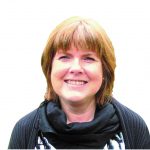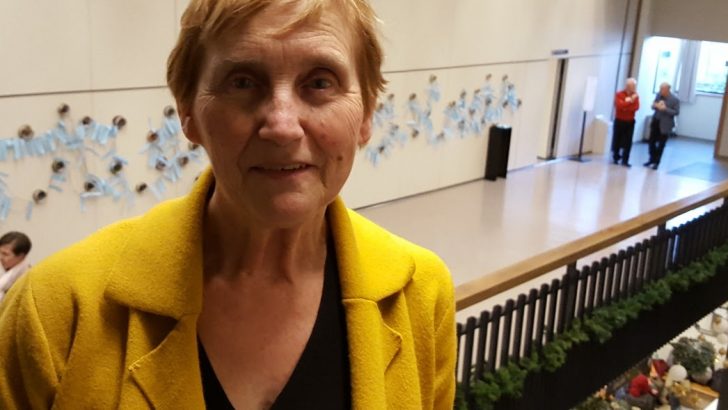I met Marlies Bolsias by chance at a conference which had Mary, Mother of God, as its central theme. During a feedback session, Marlies spoke about how Mary had come to her aid during a crisis pregnancy as she prepared for an abortion. Afterwards, in a quiet translation booth, she told me her story.
Marlies Bolsias grew up in southern Holland, the youngest in a family of eight. When she was born, both her parents were over 50. Her nearest sister, a Downs baby, had died just months after birth. “You can imagine how worried my mother was when eight years later she was expecting me,” she said.
From a young age, Marlies was aware of how difficult her mother’s pregnancy had been. “She feared she would not see me grow up.” An icon of Our Lady of Perpetual Help occupied pride of place in their home where her mother used to say the Rosary. Often she told Marlies: “When I’m no longer around, Mary will always be with you!”
A terrifying prospect for a four-year-old: “I would say: ‘No mum, YOU have to stay with me! I don’t know Mary!’” “Ah but she knows you!” replied her mum. At night, Marlies prayed to Mary: “Don’t ever let me live without a mother.”
Her teenage years were turbulent ones. Marlies felt oppressed by over-protective parents and siblings. As priests and religious congregated in their home which was a hub for Catholic activities, the feeling of rebellion grew within her. Aged 16 she met a group of motorbike-riding hippies. “They had no barriers or restrictions. I thought ‘that’s real freedom’.”
Pregnant
She lived a double life between her sedate older parents and school where she excelled at her studies, and her anarchic hippy friends, through whom she met Ernst, the Indonesian drummer in a band called Blitz Kickers. “I had just turned 19 when I discovered I was pregnant,” she told me.
She felt her world collapse. When she finally broke the news to her parents, her mum couldn’t stop crying and her dad fell silent. Ernst was totally unprepared.
The school in which Marlies had started to teach politely asked her to leave. The only support seemed to come from her hippy friends who suggested abortion. They made all the arrangements, getting the two doctors’ signatures required by law and making the appointment for the clinic. Meanwhile, Ernst seemed indifferent one way or the other.
“Inside me a huge battle was going on driving me to the point of suicide,” she says, recalling the night she went to a station, intent on throwing herself under a train. “But in the end, I couldn’t do it. I didn’t tell anyone.”
A week later Marlies was in the abortion clinic. “Everything was ready, I just had to wait half an hour. Five metres away was the operation table where the procedure would be done.”
Her life passed before her – her childhood and her mother’s big heart. “How fearful she must have been, expecting me. But she had let her mother’s heart guide her. She wanted to give life to me.”
“I thought of her strong faith in Mary, the Madonna. In my mind I saw once again that treasured picture of Our Lady of Succour, her Rosary and my prayer as a child to Mary. ‘My mother was sad and anxious giving birth to me at 51. What a strong woman she was. I want to be like her’.”
“Then it was as though a gentle voice and a hand propelled me with great love outside the waiting room,” she recalled, “as a strong feeling of motherhood filled my heavy heart.”
On her return, her father, who knew nothing of the appointment, opened the door. Seeing her distraught face, he put his arms around her: “We’ll help you.”
Marlies married Ernst and some months later Jesse was born. She lived with her parents and Ernst, who was doing military service, visited at weekends. But their relationship was not good and almost from the start Marlies planned her escape. “When I have my own house, I’ll divorce.”
Two years later they moved to Vlissingen. Korre, Marlies’ eldest older sister, invited the family to a Christian gathering. They agreed to attend a session or two “until they got bored”.
“They were talking about love,” recalls Marlies. “In one talk they talked about seeing Jesus in each person. As a hippy, I threw everything away but I still liked Jesus. I thought ‘imagine if Jesus came to my street and asked to come and eat with me – that’s the way I must see Ernst and prepare a meal for him’.”
It doesn’t sound like a big deal, but for Marlies it was. At heart she and Ernst – an architectural student as well as a drummer – were both artists. Marlies, back at university, filled her days studying, reading, playing music, and singing, with her parents looking after Jesse: “I didn’t cook or keep house. I couldn’t even make coffee.”
Laid back
Ernst was laid back. “If there was no food, he’d say ‘That’s okay, I’ll go to the Chinese’.”
But the seed had been sown and a slow transformative process began in their relationship. “I realised I had to leave my study and be glad that Ernst could continue his.”
Marlies worked part time, devoting herself to Jesse and she learnt to cook! “Things began to improve between us,” she says smiling. Ernst noticed the change at home, asking himself what was going on. After a period of time, he too got involved in the Christian community from which Marlies got support.
Looking back at their long marriage, she says the difficulties, of which there have been many, are “the most wonderful moments” because “they are the moments when something grows”.
“Step by step, with much falling and getting up again, I see that Mary, my mother in heaven, has always been there for me. In April we celebrated our 50th anniversary with our seven children and 12 grandchildren and Mary was not missing.”


 Susan Gately
Susan Gately Marlies Bolsias
Marlies Bolsias 